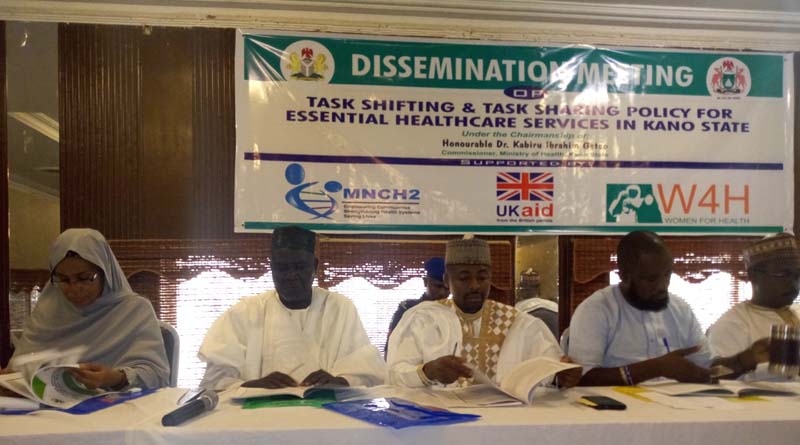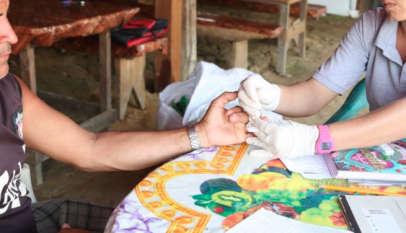SUCCESS STORY: Kano State Launches Health Sector Task Shifting & Sharing Policy (TSSP)
The Executive Governor of Kano State His Excellency (Dr) Abdullahi Umar Ganduje on Sunday November 5, 2017, formally launched the Kano State Health Sector Task Shifting & Sharing Policy (TSSP) in a ceremony that took place at the Kano State Government House and was attended by key stakeholders in the state’s health sector including development partners

In his speech at the launch event, Governor Abdullahi Umar Ganduje appreciated the support of the Federal Ministry of Health (FMOH) and development partners in the domestication process of the Kano State Health Sector Task Shifting & Sharing Policy (TSSP) and assured of Kano State Government’s continued commitment towards improving the quality of healthcare services in the State.
Earlier on, in his opening remarks, Kano State’s Commissioner for Health Dr. Kabiru Ibrahim Getso described the launch and subsequent implementation of the TSSP, which he said was part of the on-going Kano State Government’s drive towards addressing Human Resource for Health (HRH) gaps in the state, as indeed timely.
“To ensure that the healthcare system is working optimally, Kano State Government has domesticated the Task Shifting and Task Sharing Policy Document to address human resource for health gaps and improve quality of services provided by all cadres of health care workers in the State,” says the Commissioner.
The Commissioner also expressed appreciation to the Federal Ministry of Health, DFID funded Maternal, New Born and Child Health (MNCH2) and Women for Health (W4H) programmes and other donor partners that includes WHO, UNICEF, CHAI, EU-SIGN as well as all relevant stakeholders for their guidance and technical support in the processes leading to the successful actualisation of the domestication of the TSSP in Kano State.
“Our appreciation goes to the Federal Ministry of Health, the National Primary Heath Care Development Agency (NPHCDA) and our numerous development partners such as WHO, UNICEF, CHAI, CDC-NSTOP, MNCH2, EU-SIGN, W4H, CORE GROUP, Rotary International, Dangote, Bill and Melinda Gates Foundations, among many others for their continues support in improving the health care delivery system of our dear state,” says Dr Getso.
The Honourable Commissioner also appreciated the DFID-funded MNCH2 and W4H programmes for sponsoring the printing of 4000 copies of the TSSP document for distribution across health regulatory agencies and healthcare facilities.
“I want to use this opportunity to most sincerely thank MNCH2 for supporting the process of the development of the TSSP, technically and financially, from the beginning to its successful end, including the sponsorship of the printing of the TSSP document. I really want to thank you for your support to Kano state’s health sector,” said the Honourable Commissioner for Health.
Also speaking at the event, DFID Funded MNCH2 Kano State Team Leader Dayyabu Mahmud Yusuf ably represented by MNCH2 Kano’s Strategic Planning Coordinator Abdulkadir Salisu Kabara congratulated Kano State for the domestication and formal launching of the TSSP as well as other giant strides Kano had recorded in the health sector most notably, the recent passage of the Kano Health Trust Fund Law (KHETFUND) as well as establishment of the Kano State Contributory Healthcare Scheme amongst other giant strides.
“This singular milestone will go a long way in addressing Human Resource for Health (HRH) challenges as well as provide an enabling environment for sifting and sharing task amongst healthcare providers with sufficient training and retraining, which will greatly improve the number of skilled health care providers across the State,” said Kabara
He further expressed MNCH2’s commitment to continue to provide technical support to the health sector in the area of sensitization and mentoring of healthcare providers on the Task Shifting & Sharing Policy.
After the launch Kano State Health Sector Task Shifting & Sharing Policy (TSSP) in November 2017 a dissemination meeting was held for key stakeholders in the state’s health sector on January 5, 2017, which was chaired by the Honourable Commissioner of Health. The meeting which was supported by MNCH2 and W4H had in attendance heads of health regulatory agencies, directors and zonal directors under the ministry of health and its agencies, chief medical directors of major hospitals and members of the civil society, amongst others.

While providing a background and rationale for domesticating the policy in Kano state at the meeting, Dr Mukhtar Gadanya said the goal of task shifting and sharing was simply a system of getting the right workers with the right skills in the right places to do the right things without necessarily abandoning other methods of increasing the number of qualified health workers.
He added that the TSSP was also aimed at achieving universal health coverage (UHC) for Kano’s population through the mobilization of available human resources for equitable, accessible, and effective delivery of essential health care services.
“Task shifting is the rational redistribution of tasks among health workforce teams. Specific tasks are moved, where appropriate, from highly qualified health workers to health workers with shorter training and fewer qualifications in order to make more efficient use of the available human resources for health. And task sharing is defined as allowing a wider range of cadres to offer certain services, when this can be done safely and effectively as a means of rapidly expanding access and improving health care,” said Dr Gadanya.
He stated that task shifting has been used in a number of countries to address the human resource shortages that militate against the provision of critical services such as HIV testing and treatment with antiretroviral drugs, community distribution of injectable contraceptives as well as in performing malaria rapid diagnostic tests, amongst others, which he said had allowed for rapid scale-up and complete coverage.
While speaking on the density of healthcare workers in the state, Dr Gadanya said as of January 2017, Kano State had a total of 359 medical doctors which amount to a density of 2.8 per 100,000 populations while the density for nurses and midwives stood at 8.0 and 5.9 per 100,000 populations, respectively.
He said based on this statistics, the median density for the three cadres in Kano is 5.6 per 100,000 population which he described as substantially below the minimum requirement of 2.28 per 1,000 population, as stated in the World Health Report, and therefore an issue of great concern. He stated that the sub-optimal health care workers (HCWs)-patients ratio had effect on the provision of essential healthcare service adding that whereas about 80% of Kano’s population live in rural areas, only about 26% of the healthcare workers in the state live in rural areas.
“In many parts of the state, there are many employed but under-utilized healthcare workers who can be trained to improve competency around health priority areas and given specific responsibilities for the care of vulnerable citizen of Kano in hard to reach areas. Community health extension workers belong to this group,” he said.
The Kano Health Sector TSSP covers a wide range of services including family health, ante-natal care, delivery and new-born care; post-natal care; family planning and integrated management of childhood illnesses (IMCI). Others are essential nutrition; Routine Immunization (RI); adolescent reproductive health as well as communicable diseases like Tuberculosis, Leprosy, HIV/AIDS and other sexually transmitted diseases (STDs), amongst others.













